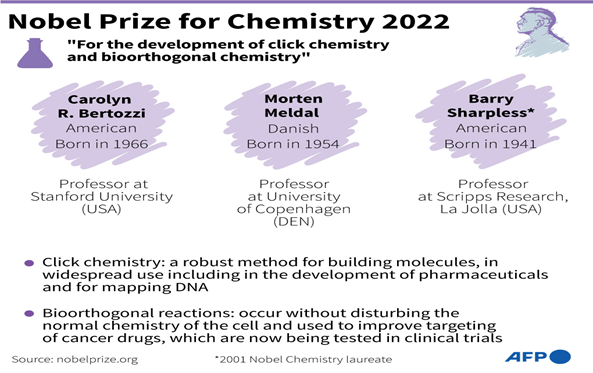Governance
In News: This year’s Nobel Prize in Chemistry has gone to Carolyn Bertozzi and Barry Sharpless of the United States and Morten Meldal of Denmark who have made a strong case for adopting an alternative approach to producing new complex molecules, which minimises waste and increases overall efficiency.

About:
- Sharpless is the originator of the concept of ‘Click Chemistry’.
- He found the first chemical reaction that satisfied the criteria for ‘Click’ reactions using a nitrogen-containing cyclic compound and discovered that use of copper as a catalyst eliminated the by-products.
- Carolyn Bertozzi in 2004 developed a few ‘click’ reactions that work inside living organisms.
- The name “Click”, has been taken from the click sound that airline seat belts make when they are fastened.
- While trying to produce any particular compound or a complex molecule, one must look for starting molecules that easily react with each other or fit into each other, or ‘click’ with each other.
- The reacting molecules should be in a made-for-each-other kind of situation for this particular reaction.
- This makes the resultant chemical reaction more efficient.
Significance:
- Mimicking nature is expected to bring in effectiveness and sustainability in man-made processes and products as well.
- Vast potential in the pharmaceutical industry – The industry uses a lot of naturally occurring but industrially synthesised molecules. Every kilogram of a drug produced results in the generation of nearly 25-100 kg of chemical waste, making it inefficient.
- Bertozzi’s methods have shown the promise of treating advanced cancer. Cancer drugs based on her approach are now undergoing clinical trials.
Source: The Hindu
Previous Year Question
Q.1) Bollgard I and Bollgard II technologies are mentioned in the context of: (2021)
- clonal propagation of crop plants.
- developing genetically modified crop plants.
- production of plant growth substances.
- production of biofertilizers.











